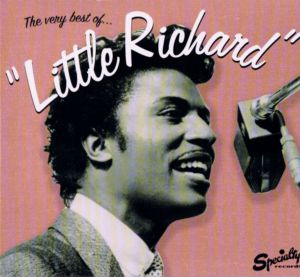
- Format: FLAC

(TOP 100 AMAZON REVIEWER)
Fifty-plus years after budding blues singer Richard Penniman transformed himself into the prototype wild man rock `n' roller Little Richard, these seminal sides on Specialty retain every bit of their invention and abandon. Recorded in New Orleans with the rock 'n' roll pillars of Earl Palmer's second-line drumming and Lee Allen's muscular, swinging saxophone, Little Richard's best singles are as good as any rock 'n' roll records ever recorded. His outlandishly raw and seductive vocals stretched the microphones to their limits, just as his hammering on the piano often threatened to shake his instrument apart.
The hits are radioactive elements of the rock 'n' roll lexicon, their radiance undimmed by fifty years of tribute, imitation and repetition. Starting with 1955's "Tutti Frutti" Richard waxed a string of scorching sides that included "Long Tall Sally," "Good Golly, Miss Molly," "Rip It Up," and "Ready Teddy," each invested with a level of vocal exuberance unmatched by his contemporaries.
Even when he'd take a breath and drop the key below the top-edge of his range, as on the mid-tempo "Slipin' and Slidin' (Peepin' and Hidin')," his voice remained edgy, and his instrumental battles with Lee Allen reaped brilliant rewards. Richard wrote or chose songs whose themes matched the newly acquired independence felt by mid-50s teens. Even with the lyrics tidied up here and there, the sexuality was hard to miss, and coupled with the brazenness of Richard's vocals (and Lee Allen's sax), it's easy to see how rock 'n' roll menaced 1950s Eisenhower America.
Even with all this inventiveness, as early as 1956 some of Richard's singles began to sound repetitive. "Heeby Jeeby" and "She's Got It," for example, borrowed liberally from their predecessors. Later in the year, Richard's label head, Art Rupe, maneuvered him into the title song of "The Girl Can't Help It," written by Bobby Troup. The production retains the New Orleans phrasings and edgy vocals of Richard's earlier sides, but adds stagey background singers. Richard still had plenty of thrills in him, however, laying down "Lucille" and "Jenny Jenny" to fill out the year. In between he dropped the Lloyd Price styled ballad "Send Me Some Lovin," penned by Price's brother, adding dynamics to accommodate a bluesier tune.
The rock 'n' roll blast furnace was stoked again in 1957 with the raucous "Keep A-Knockin'," but shortly thereafter Richard quit the business to attend bible college. His vacillation between preaching and rocking (that is, the sacred and the profane) prompted Specialty to issue older sides as new singles in 1957, charting his last U.S. hits with 1955's "True Fine Mama" and 1956's "Good Golly, Miss Molly."
A pair of tin pan alley standards, "Baby Face" and "By the Light of the Silvery Moon," hit the U.K. top-20 in 1959, but it wasn't until he returned to touring in 1962, and found fans in the Beatles, that he once again placed himself on the U.K. chart with 1964's "Bama Lama Lou." Filling out the CD are surprisingly sedate covers of Leiber & Stoller's "Kansas City," and one of Richard's original Specialty audition demos, the blues "Baby."
Closing the disc is a live medley from 1964 that gives listeners a sense of Richard's commanding performance, even as his band played more soulful than New Orleans raw.
This set's extras are interesting, but don't compare to the visceral brilliance of the singles, all of which have been available on numerous vinyl and CD collections over the years. Specialty's 1991 release for example, "The Georgia Peach," offers the same hits with a different selection of bonuses, and Great Voices of the Century's "Rip it Up: The Hits and More 1951-1957" offers a broader view that includes sides from RCA and Peacock alongside the requisite Specialty recordings.
This latest set comes in a tri-fold digipack featuring excellent full-panel photos and an insert booklet with more photos and liner notes by Billy Vera. This is a terrific one-disc shop for those who want a focused introduction to Little Richard's best-loved Specialty sides. 4-1/2 stars, if allowed fractional ratings.